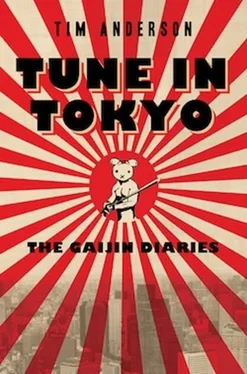Admittedly, I’m not just irked because of the panda attack. It’s that it happened to occur simultaneously with an early-morning earthquake tremor deep beneath the city. I wake to the bed shaking. Also the bureau, the television, the sliding wooden door that opens out on the kitchen, and the walls. And since Tokyoites are expecting “the big one” any day now, I quickly jump to the conclusion that that day is today and the panda in my dream was just an adorable li’l angel of death.
I sit frozen on the shaking bed for a few moments, praying for everything to stop wobbling, hoping there isn’t a bigger tremor to come. After a few minutes, I stop writing goodbye e-mails to friends and family in my head and start to calm down. I’ve experienced these tremors before, and it’s always the calm after the shaking stops that is the eeriest; it’s still within the realm of possibility that something has been jiggled loose (a nearby house, a telephone pole, Tokyo Tower), something that will soon come crashing down on my bed without warning.
I gather myself together, clamber out of bed, and slide into the chair at my desk. I figure I may as well watch television while I’m waiting to be crushed, so I switch it on and go out to the kitchen to make some tea and toast. When I return to my room, I’m greeted with a horrifying image on the television screen, one that will emblazon itself on my memory for weeks, maybe years, to come.
It’s a commercial for the Japanese language version of Annie currently running in Tokyo, complete with a freckle-faced, curly wig-wearing Japanese girl squeaking out the words to “Tomorrow” in Japanese.
I. Am. Aghast. There are many things that should never be allowed to leave America’s borders. Adam Sandler movies, for example. Fox News. The McRib Sandwich. But number one on the list, I feel sure of it, is the musical story of that nauseatingly precocious and cherubic red-haired orphan who, whenever she has a problem, is bored, or just has some time to kill, thinks it necessary to sing songs through her nose in a voice that could wilt plants, crash airplanes, and bring about worldwide famine.
“The horror…the horror,” I murmur, convinced I will never fall asleep again.
Later, on the train on my way to Shibuya to do some record shopping, I am still feeling the aftereffects of unprotected exposure to Jap-Annie. As it happens, I’m sitting across from a young office lady holding in her lap a tiny blue purse with a pastel drawing of two dancing bunnies, a chicken, a strawberry, some flowers, and the words “Something Pretty” on it. I think of Tare Panda. I think of little orphan Jap-Annie. I want to vomit.
Looking around me, I see the train is dense with commuters with their heads buried in a variety of reading material. Many read comics full of characters with glistening eyes half the size of their heads. Women read fashion magazines, like Cutie , one of the most popular. In its pages, young ladies can find useful tips on how to wear oversized bracelets, pink barrettes, fluffy scarves, tiny handbags, wacky hats, flowery shoes, pastel nail polish, futuristic headphones, bubble gum lip gloss, sparkly eye shadow, tight/bright T-shirts saying things like “Sweetheart” and “Kissypoo Sugar,” wide-eyed girl-next-door expressions, and countless other tried and tested ways to optimize their cuteness and make sure they’re never the last sweetie on their block to have that completely necessary YumYum brand, bunny rabbit-embossed makeup kit.
Considering my panda dream again, I decide that my subconscious is desperately trying to tell me something. It is this: the Japanese obsession with all things cute is becoming a little more than I can handle.
I think back to when I opened my first Japanese bank account. I had two choices of bankcard designs. The first one was a lovely drawing of a small boy on a fishing boat staring at the setting sun against a beautiful auburn sky. Elegiac and elegant. The other choice was a picture of a cartoon bunny named Miffy who looks like Hello Kitty with bunny ears and no nose. He was licensed as the bank’s mascot. The friendly bank teller told me it was the most popular choice. After a few moments of quiet reflection, I chose the fishing boat sunset one, ignoring the devil inside me screaming, “Give me that bunny!”
“Tim, really,” I lectured myself. “Calm down. You don’t need the bunny. You want the bunny, but you don’t need the bunny. Yes, he’s cute. But is that really what you need in a bank card? Choose the sunset background and walk away.”
Cuteness is of utmost importance in this country. It’s why the films of chipmunk-faced Meg Ryan have always been infinitely more popular than those of giant-jawed Julia Roberts. It’s why adorable Audrey Hepburn’s image is used to sell products from bottled jasmine tea to English lessons at Berlitz. It’s why Tokyo Disneyland exists, why there are giant Snoopy Stores in Tokyo and Yokohama, and it is, I will forever believe, why Cher never became a superstar in Japan. With her long narrow face, dour expression, Medusa-like tendrils of hair, and overactive serpentine tongue, she is the antithesis of cute. She’s the stuff of nightmares. The Japanese would much rather be entertained by Michael J. Fox.
At the giant RECOFAN record store in Shibuya I go to the Japanese section to see what’s on offer. No shortage of cute over here. One of the most popular pop bands in the country in the past few years is an all-girl troupe going by the name of Morning Musume, which translates, worryingly, to Morning Daughters. They are the female Japanese Menudo, an ever-changing roster of pubescent-sometimes prepubescent-young ladies brought together by a record company to help satisfy the Japanese public’s demands for endless gallons of teenage squeakpop. They sing (off-key), dance in formation (like drunk beauty pageant contestants), and wear brightly colored costumes (the kind seen in Southern American parades). They’re horrendous. They sell millions. They’re fucking everywhere. And each one is probably set to embark on an equally cute solo career during which she will tour the country dressed in a tutu, holding a fluffy pink baton and singing nursery rhyme-like songs that will provide her with a bit of cash flow before it all comes to a crashing halt when she reaches the cutoff age of twenty-five. Because twenty-five, my friends, is not a cute number.
There’s nothing like the sound of a group of Tokyo girls gathered around a store window display featuring whatever character is the It cutie of the moment and screaming their approval with a bloodcurdling “KAWAIIIIIII!” It means “cute,” but it also implies “in,” “we like,” and “that would look really good on a handbag, a T-shirt, a cell phone screen, and a pair of underwear!”
“Kawaii!!” If you hear that word directed at you, you’re in there, man, you’re hot, you’ve really got it. You are officially cuddly. I’ve not had that word directed at me.
Whereas in America the number-one preoccupation is being thin (eating french fries being a close second), in Japan, they don’t generally have to worry about the bloat factor. They do, however, have to worry about not being kawaii enough.
Recently, while on my way to work, I ran into one of my students, Ryoko, a basic-level student in her late forties who was always a joy to teach, and though she was typically insecure about her English abilities, she was never shy about giving it a try. I saw she’d gotten a haircut, and I complimented her on it.
“Oh, you’ve had a haircut,” I said, pointing to her head with one hand and mimicking a pair of scissors with the other. “It looks really nice!”
She smiled and said thank you. She looked pensive, though, as if she wasn’t ready to move on to a different topic. As if what I’d said was deficient in some way.
Читать дальше












